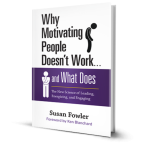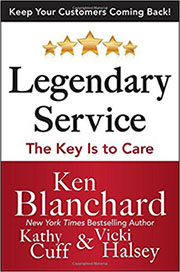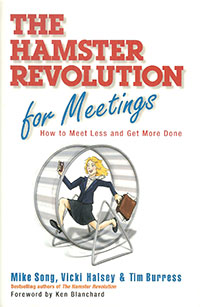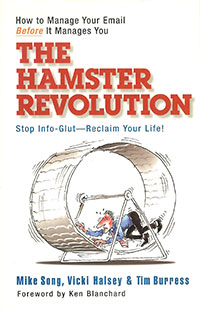 Managers often miss the most important part of performance management conversations by focusing only on results and accountability, says Susan Fowler, author of the new book Why Motivating People Doesn’t Work … and What Does. In an interview for The Ken Blanchard Companies’ Ignite newsletter Fowler recommends that managers shift their focus from holding people accountable for results to looking at creating the type of environment where people will take on the responsibility for those results themselves.
Managers often miss the most important part of performance management conversations by focusing only on results and accountability, says Susan Fowler, author of the new book Why Motivating People Doesn’t Work … and What Does. In an interview for The Ken Blanchard Companies’ Ignite newsletter Fowler recommends that managers shift their focus from holding people accountable for results to looking at creating the type of environment where people will take on the responsibility for those results themselves.
“There is a huge difference between seeing your job as holding people accountable for results versus helping them to be accountable. People want to be accountable. They want to make a contribution and do the right thing. If you, as a manager, find yourself having to hold people accountable, there is a breakdown in the process and in the way that goals, metrics, and the work environment have been defined.”
“People are always motivated,” explains Fowler. “Your job as a leader is to understand why a person is motivated the way they are and then help them understand their choices, opportunities, and options.”
Fowler encourages leaders to recognize different Motivational Outlooks—or reasons people are motivated. Motivational Outlooks fall into two broad categories with significantly different implications: Optimal and Suboptimal.
Suboptimal Motivational Outlooks are generated by external incentives such as money, rewards, status, and power, or negative repercussions if targets aren’t met.
Optimal Motivational Outlooks describe motivation based on work aligned with higher-level values or connected to a noble purpose, or inherent joy and pleasure. Fowler explains that when people act from Optimal Motivational Outlooks, they see the value of their work and how it helps them experience an increased sense of control, enhanced relationships, and new skills.
Organizations whose practices promote Suboptimal Motivational Outlooks not only suffer long-term performance, productivity, and innovation loss, but also find themselves dealing with the aftermath of thwarting people’s psychological needs: namely low morale, high turnover, absenteeism, inventory shrinkage, and other ways of people acting out to make up for what they are missing. It leads to an attitude of work as a transaction, “I will only do this if I get that.”
“There is a huge opportunity loss with this approach,” explains Fowler. “We are not getting the best from people under those conditions. Workplaces based on Suboptimal Motivational Outlooks—carrots or sticks—to increase results may achieve short-term behavior change but end up with compliance, not commitment.”
Take a Different Approach
Fowler encourages leaders to take a different approach. To begin, Fowler recommends promoting autonomy, relatedness, and competence. “A good place to start is to change the way you present goals and deadlines that too often undermine people’s sense of autonomy. Reframe goals and deadlines as vital information that will help people succeed instead of techniques for holding people accountable.
“Promote relatedness through values conversations; help people align their work with meaningful values and a sense of purpose. Tap into what is inherently rewarding to people. The best leaders create an alliance with their people that goes beyond compliance.
“Develop people’s sense of competence by asking, ‘What did you learn today that will help you be better tomorrow?’ instead of only focusing on ‘What did you get done today?’”
It’s about having Motivational Outlook Conversations with people to surface the type of motivation people already have and guide them to better choices—for their own well-being and the benefit of the organization as well.
 To learn more about Fowler’s approach to motivation, download a free chapter of her book, Why Motivating People Doesn’t Work … And What Does or check out her complete interview in Ignite, Employee Motivation: Focus on Process Instead of Results. Also be sure to take a look at a complimentary webinar Fowler is conducting on October 22, Rethinking Five Beliefs That Undermine Workplace Motivation. It’s free courtesy of Cisco WebEx and The Ken Blanchard Companies.
To learn more about Fowler’s approach to motivation, download a free chapter of her book, Why Motivating People Doesn’t Work … And What Does or check out her complete interview in Ignite, Employee Motivation: Focus on Process Instead of Results. Also be sure to take a look at a complimentary webinar Fowler is conducting on October 22, Rethinking Five Beliefs That Undermine Workplace Motivation. It’s free courtesy of Cisco WebEx and The Ken Blanchard Companies.

Read more http://leaderchat.org/2014/10/09/dont-hold-people-accountable-do-this-instead/






